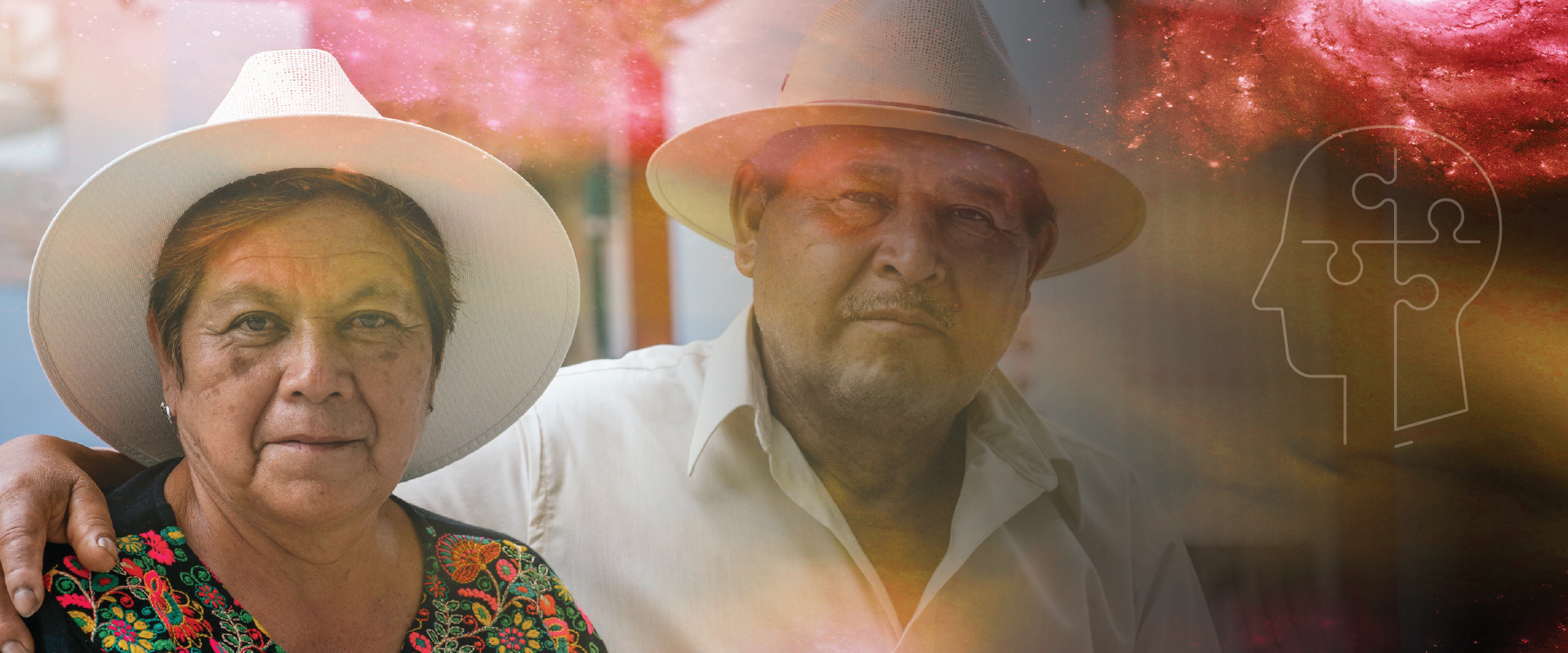By Wynne Parry
Researchers know age and genetic variation can increase susceptibility to Alzheimer’s disease. Some, however, are wondering how a person’s life experiences — specifically culture and language — might contribute.
Idaly Vélez-Uribe, Ph.D., a postdoctoral fellow, and her mentor Mónica Rosselli, Ph.D., neuropsychologist, are working to understand how a unique set of factors shared by many Hispanics might affect their vulnerability, or resistance, to the devastating decline in brain function associated with Alzheimer’s.
Much previous research on this disease has focused on white, non-Hispanic patients at the expense of other groups. However, representation matters in these studies because Hispanics, like African Americans, have higher rates of Alzheimer’s. What’s more, Hispanics are the most rapidly growing racial or ethnic group in the country.
Rosselli, a professor of psychology in the Charles E. Schmidt College of Science, and Vélez-Uribe suspect that experiences common among Hispanics — such as the stress of resettling in a new country, a culture of family involvement, and the ability to speak both English and Spanish — might alter their risk for abnormal cognitive decline and dementia, including that seen in Alzheimer’s. For example, some research suggests that bilingualism has a protective effect on the aging brain, a controversial possibility they are currently investigating.
In spring 2021, Vélez-Uribe was among four FAU researchers to receive funding from the Florida Department of Health’s Ed and Ethel Moore Alzheimer’s Disease Research Program. These grants support early-stage projects and, in Vélez-Uribe’s case, professional training for new investigators. The two-year, $99,051 grant will aid her goal of becoming an independent researcher.
So far, decades of intense scientific effort yielded only relatively modest improvements in treatment for Alzheimer’s, an irreversible brain disease that is among the most common causes of death in the U.S. Meanwhile, the stakes continue to grow.
“Because the U.S. has an aging population, Alzheimer’s is expected to place a growing burden — both emotional and financial — on society in the decades to come,” said Gregg Fields, Ph.D., executive director of the Institute for Human Health and Disease Intervention. “We urgently need to develop more effective ways to detect and treat
this condition.”
Researchers at FAU are attacking the problem from many angles, a handful of which are represented in these grants. For their part, Vélez-Uribe and Rosselli are working on a federally-funded project, called the 1Florida Alzheimer’s Disease & Research Center (ADRC), which recruits patients for long-term studies. ADRC includes a collaborative network of investigators from FAU, the University of Florida, University of Miami, Florida International University and Mount Sinai Medical Center. Half of the patients it enrolls are Hispanic.
In their research, Rosselli and Vélez-Uribe look for links between features of the brain, such as the size of certain regions within it, and cognitive function. These mental processes could include, for example, the ability to recall the right word, to remember facts or events, or perform activities necessary for daily living. Rosselli and Vélez-Uribe also investigate how these attributes may vary for older people of different ethnicities or who speak two languages.
Vélez-Uribe began researching Alzheimer’s after first studying the neuropsychology of bilingualism in younger people, an interest motivated by her own experience as a Spanish speaker. In her native Colombia, she could not tolerate the crass humor of the cartoon South Park. But her reaction changed when she watched the show in English. “I saw my husband watching it, and I found myself interested. I was even able to laugh at the jokes,” she said.
The experience became the basis for her master’s and doctoral research, which found evidence that bilingual people experience emotions less intensely in their second language. The move to Alzheimer’s felt like a natural continuation of this work in cross-cultural neuropsychology, she said.
NEW IDEAS, NEW HOPE
In April 2021, the state’s Ed and Ethel Moore Alzheimer’s Disease Research Program awarded a series of grants to the university. In addition to funding for Idaly Vélez-Uribe, Ph.D., and Mónica Rosselli, Ph.D., the grants are supporting the following research projects:
- Growing evidence suggests that cholesterol deficiency may contribute to aging-associated brain disorders including Alzheimer’s. Qi Zhang, Ph.D., a research assistant professor of biomedical science in the Charles E. Schmidt College of Medicine, is investigating whether or not rebalancing brain cholesterol can reduce or even reverse
neurological degeneration. - Using cells in culture and mice, Howard Prentice, Ph.D., a professor of biomedical science in the Charles E. Schmidt College of Medicine, will investigate the ability of sulindac, a nonsteroidal anti-inflammatory drug, to protect against harmful neurological
changes that occur
in Alzheimer’s.
